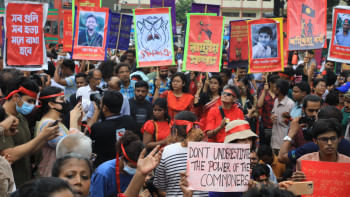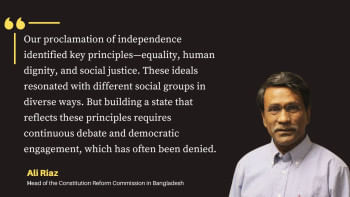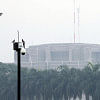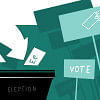Voter education: The missing link in government’s democratic reform

Political education is not a luxury. It is essential for the very survival of democracy. Plato cautioned that democracy turns perilous when citizens are uninformed. In Bangladesh, many voters sell their votes for a few thousand takas. If they truly grasped the profound socio-economic significance of their vote, would they still make such a choice?
A vote is not merely a token. It is a social contract between the citizen and the state, an agreement that, in exchange for the vote, the voter should receive security and good governance.
By selling their vote upfront, individuals essentially forfeit access to critical public services such as free, publicly funded healthcare, state-guaranteed fair wages, employment opportunities, quality education for their children, fair prices for their produce, and access to justice. Over the course of a five-year term, the cumulative loss from being deprived of these entitlements could amount to several lakhs of taka.
Though free and fair election should guarantee democracy, this is only a half-truth. When voters are swayed by short-term gains, such as monetary incentives, democracy becomes a commodity rather than a process of genuine representation. Moreover, Bangladesh faces another problem rooted in the patron-client leadership model. Leadership positions often stem from family ties or patronage rather than merit or competence, perpetuating a cycle of incapable governance time and again.
In any society, the struggle for democracy must begin with the political education of the masses. Yet neither the Election Commission (EC), political parties, intelligentsia, nor social activist groups have seriously prioritised or worked towards this most fundamental requirement. The interim government has pledged to reform state institutions and conduct a free and fair election, but it has shown no visible initiatives in promoting civic education or political awareness among voters, thereby risking the reversal of whatever changes they implement.
Although transforming an entire population into politically engaged, fully empowered "active citizens" is a long-term endeavour, the interim government can take a vital first step by launching a comprehensive voter education programme. Even instilling a basic awareness that selling one's vote for immediate gain is, in effect, sacrificing far greater entitlements for a fleeting benefit, can begin to shift public consciousness.
The EC and the interim government are uniquely positioned to lead an impartial, nationwide voter education campaign. They can leverage the existing administrative infrastructure, including local government bodies, publicly funded schools and colleges, upazila level land administration, agricultural extension services, and cooperative departments, where such programmes can be seamlessly integrated.
It is also possible to implement a meaningful voter education programme within the limited time available to the current interim government.
Between 1996 and 1997, Bangladesh successfully implemented a grassroots initiative known as the Local Democracy Education Programme (LDEP), funded by USAID and supported by the Asia Foundation and BRAC. The programme, carried out by dozens of NGOs across 12 different districts, aimed to promote voter education through both innovative and practical means. These included distributing educational materials such as posters and leaflets and organising public gatherings, workshops, and courtyard meetings to raise awareness among voters.
Maintaining political neutrality, LDEP urged voters to reject candidates linked to religious extremism, candidates with criminal records, and corruption. The programme's impact was remarkable: in the December 1997 Union Parishad elections, in LDEP's area of operation, voter turnout exceeded 90 percent, women participated in unprecedented numbers, and both vote rigging and the influence of money declined significantly. Notably, NGO assessments found that 43 percent of elected candidates were honest and capable, making it one of the most credible and memorable elections in the public memory of those areas.
Similar success stories have emerged from countries like Kenya, Indonesia, Mexico, and South Africa, where election commissions and various NGOs implemented voter education programmes with notable success.
These examples reveal several key factors for the successful implementation of such programmes: maintaining a non-partisan attitude is essential for building public trust; using simple and accessible language is more effective than relying on academic jargon; combining mass media platforms such as radio, television, and SMS with community-level workshops maximises outreach; and emphasising both "how to vote" and "why voting matters" significantly strengthens voter engagement.
In the current political landscape, major political parties are unlikely to support a non-partisan voter education programme. This situation presents an opportunity for smaller political parties, which often struggle to compete within the existing framework. By promoting voter awareness through their own networks and communication channels, these smaller parties can not only strengthen democratic participation but also help create conditions that may eventually allow them to compete on a more level playing field.
Large NGOs with strong rural networks can also play a critical role. The interim government can actively engage with these organisations, encouraging them to integrate voter education into their ongoing programmes. Many international development partners provide funding for democracy-related initiatives, which NGOs can explore to support these efforts. Civil society organisations and concerned citizens must also be part of this process.
By mobilising NGOs, civil society organisations, and ordinary citizens around a shared agenda of voter education, the government can lay the groundwork for lasting democratic reform. If pursued with sincerity and collaboration, this collective endeavour could yield meaningful results, not only in the upcoming election but in all future ones as well.
Saifur Rahman is a senior IT specialist and certified professional.
Views expressed in this article are the author's own.
Follow The Daily Star Opinion on Facebook for the latest opinions, commentaries and analyses by experts and professionals. To contribute your article or letter to The Daily Star Opinion, see our guidelines for submission.

 For all latest news, follow The Daily Star's Google News channel.
For all latest news, follow The Daily Star's Google News channel. 










Comments